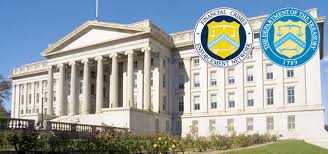BIS and FinCEN Release Joint Notice Concerning Global Export Control Evasion
Alexander J. Cotoia currently serves as the Regulatory Compliance Manager at The Volkov Law Group, where he regularly advises the firm and its clients on the latest developments implicating trade compliance concerns. He may be reached at [email protected].
On November 6, 2023, the U.S. Department of the Treasury’s Financial Crimes Enforcement Network (“FinCEN”) and the U.S. Department of Commerce’s Bureau of Industry and Security (“BIS”) released a new joint notice concerning the issuance of a new Suspicious Activity Report (“SAR”) reporting term, dubbed “FIN-2023-GLOBALEXPORT.” Financial institutions covered by the Bank Secrecy Act (“BSA”) are now required to utilize “FIN-2023-GLOBALEXPORT” when filing SARs that implicate attempts by individuals or organizations to evade U.S. export controls more globally. The notice is the latest in a series of joint notices issued by BIS and FinCEN that attempt to curb illicit export activity by giving additional scrutiny to financial transactions that might be used to conceal such activity. Although prior notices have tended to focus on specific attempts by individuals and entities to circumvent existing Russian Federation sanctions regulations, the current notice applies to export activity more broadly.
Under the notice, financial institutions are broadly cautioned to take count of attempts to circumvent export controls that support efforts of other nation-states adversaries and illicit actors to acquire sensitive commodities and technology that could be utilized to enhance such adversaries’ “foreign military capabilities or support mass surveillance programs that enable human rights abuses.” To that end, the notice encourages financial institutions to look for the following red flags in the context of suspect transactions:

- Purchases made under a letter of credit that are consigned to the issuing bank rather than the actual end-user of the controlled commodity; in addition, supporting documents, such as a commercial invoices, that do not list the actual end-user
- Transactions involving entities with little to no web presence, such as a website or a domain based email account.
- A customer lacks or refuses to provide details to banks, shippers, or third parties, including details about end-users, intended end-use(s), or company ownership.
- Transactions involving customers with phone numbers with country codes that do not match the destination country.
- Parties to transactions listed as ultimate consignees or listed in the “consign to” field appear to be mail centers, trading companies, or logistics companies.
- The item (commodity, software or technology) does not fit the purchaser’s line of business.
- The customer name or its address is similar to one of the parties on a proscribed parties list, such as the BIS Lists of Parties of Concern (e.g., Entity List, Unverified List, Denied Persons List), Treasury’s List of Specially Designated Nationals and Blocked Persons (SDN List), or State’s Statutorily Debarred Parties List; with “special attention” paid to the basis for listing on the Entity List or SDN List, as linkages to weapons of mass destruction programs or military-intelligence end-users or end-uses implicate broader controls regardless of whether an item is subject to the EAR.
- Transactions involve a purported civil end-user, but basic research indicates the address is a military facility or co-located with military facilities in a country of concern.
- Transactions involving companies that are physically co-located, or have shared ownership, with an entity on the Entity List or the SDN List.
- Transactions that use open accounts/open lines of credit when the payment services are conducted in conjunction with known transshipment jurisdictions and/or the products listed in payment memos align with those identified by BIS as a “disruptive technology” or included on the CCL.
- The customer is significantly overpaying for an item based on known market prices.
- Transactions involve a last-minute change in payment routing that was previously scheduled from a country of concern but now routed through a different country or company.
- Transactions involve payments being made from entities located at potential transshipment points or involve atypical shipping routes to reach a destination.

For the purposes of the FinCen/BIS notice, the term “disruptive technology” includes items identified jointly by BIS and the U.S. Department of Justice (“DOJ”) in the context of the Disruptive Technology Strike Force as enhancing adversaries’ military modernization efforts or capacity to perpetuate human rights abuses. These technologies include, but are not limited to:
- Advanced Semiconductors: logic/artificial intelligence (AI) chips, associated fabrication equipment, electronic design automation (EDA) software/technology, and novel materials for production below 14 nanometers (nm)
- Supercomputer Computing Hardware: including graphics processing units (GPUs), and software (including for modeling/simulations)
- Quantum Technologies
- Hypersonic Technologies
- Military Bioscience/Technology (e.g., human performance enhancements like brain computer interfaces); and
- Advanced Aerospace Technology
When filing an SAR under the new notice, FinCEN requests that financial institutions reference this alert by including the key term “FIN2023-GLOBALEXPORT” in SAR field 2 (Filing Institution Note to FinCEN) and the narrative to indicate a connection between the suspicious activity being reported in the new alert and to highlight additional advisory or alert keywords in the narrative, where applicable. This includes continuing to utilize the term “FIN-2022-RUSSIABIS” when filing SARs related to potential violations of Russian Federation-based export control regulations.















